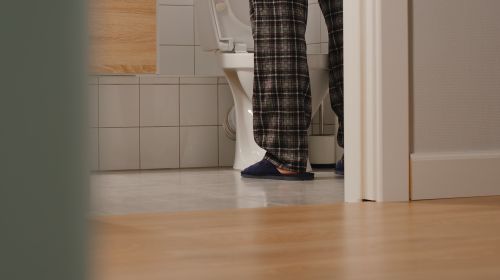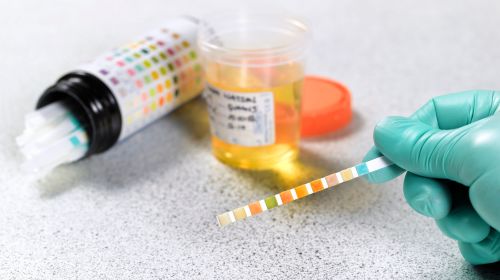Typical symptoms of a bladder infection are pain and burning when urinating. But there are other triggers for the symptoms. Here you can find out what these are, when medical help is required and how the symptoms can be alleviated.
- © Getty Images/RealPeopleGroup
Brief overview: Burning when urinating
Definition: The medical term for painful urination is Alguria, and the symptom falls under the urinary difficulty category. These include burning or itching when urinating and pain – these can radiate to the entire abdomen.
Causes: Inflammation with germs such as bacteria is often present, but diseases of the urinary bladder and urinary tract also cause painful burning when emptying the bladder.
Diagnosis: Among other things, urinalysis, determination of residual urine, blood test, ultrasound or cystoscopy.
Therapy: The appropriate measure depends on the underlying cause – home remedies such as warmth and drinking plenty of fluids, mild painkillers and antibiotics can help, for example.
Article content at a glance:
How are the complaints expressed?
Pain and burning when urinating can be very severe. Bladder inflammation (cystitis) in particular creates a real vicious circle: those affected suffer from a frequent, strong urge to urinate – at the same time, urinating causes pain. If you then stop urinating, you will be even less able to get rid of the urge and, above all, the inflammation.
The body produces around two liters of urine per day – depending on the amount you drink and the function of your kidneys. From around 200 milliliters, stretch receptors in the bladder wall react and the urge to urinate sets in. Some people already feel pain then and not only when urinating. For others, the painful burning sensation only sets in at the beginning or end of emptying the bladder. If the pain is so severe that only a little urine is passed, specialists speak of urinary retention. Those affected often also suffer from abdominal pain, and in women the entire intimate area can be irritated.
Causes of burning and painful urination
Most often, a urinary tract infection causes burning and pain when urinating. Triggers can be various pathogens, often intestinal bacteria such as Escherichia coli, chlamydia or fungi such as Candida albicans. Due to anatomical conditions, women are more susceptible to cystitis than men: Their urethra is shorter, and the urethral opening and the anus are close together – this means that intestinal germs in particular can easily get into the urethra and from there into the bladder. This often happens during sexual intercourse.
Other triggers for the symptoms:
- Sexually transmitted diseases such as chlamydia or gonorrhea (clap)
- Inflammation of the urethra (urethritis)
- Bladder stones or stones in the urethra
- narrowed urethra
- bladder cancer
- urethral cancer
- benign tumor in the urinary bladder (papilloma)
Painful urination in pregnancy
During pregnancy, the risk of a urinary tract infection such as a bladder infection is increased again. Because the hormonal changes cause the urinary tract to widen, bacteria can get into the urethra more easily. Bladder infections during pregnancy should be clarified and treated by a doctor so as not to endanger the baby.
Burning when urinating in men
While men are less likely to get cystitis, it should be taken seriously. Because the urethra transports not only the urine in men, but also the ejaculate. This means that pathogens can reach the testicles and epididymis as well as the bladder.
Older men are more likely to suffer from urinary tract infections and prostate diseases. It is often benign prostate enlargement (benign prostatic hyperplasia, BPH) or prostate inflammation (prostatitis). All of these conditions can cause burning and pain when urinating.
Treatment of painful urination
The symptom can subside after a short time even without therapy. In other cases, burning when urinating requires medical attention. Depending on the cause, various measures can be taken:
In some cases, an infection with bacteria must be taken with an antibiotic.
Fungal infections are usually treated with antifungal (antifungal) drugs.
Depending on the pathogen, antibiotics or antiviral drugs that target viruses are prescribed for STDs.
Bladder stones can be flushed out with plenty of fluids or dissolved with medication. Larger stones are shattered with shock waves or need to be surgically removed in an operation.
Home remedies to relieve the discomfort
If an uncomplicated bladder infection causes burning when urinating or if the symptoms are only mild, these home remedies can often help:
- Heat (such as a hot water bottle) on the abdomen
- warm foot baths or a sitz bath in the tub
- drink a lot, herbal teas or special bubble teas are suitable
When to get medical help?
If the symptoms are severe or last for several days, those affected should see a doctor as soon as possible. This also applies if additional symptoms occur in addition to the pain when urinating, for example:
These are signs of a more serious condition that requires professional treatment. The first point of contact is the general practitioner, gynecological or urological practice.
Diagnosis of burning pain when urinating
With a urine test, the doctor determines whether it is actually an infection of the urinary tract or bladder infection and, if so, which pathogens are the cause. Depending on the type and number of pathogens, an antibiotic may be prescribed.
If the pain occurs repeatedly, further examinations are carried out to determine the cause of the symptoms. The following examination methods are suitable for diagnosing, for example, bladder stones, an enlarged prostate or a narrowing of the urethra:
- blood test
- Determine residual urine in the bladder
- Bladder examination (cystoscopy)
- Ultrasonic
- roentgen
- vaginal swab in women
- palpation of the prostate
- urethral swab in men



